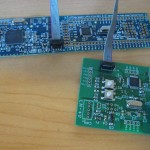We’re proud to welcome NXP as a new sponsor!
The brains of a solar car are essential. For our designs, we use a distributed network of a handful of microcontrollers. Each node in our network controls something different, such as managing the batteries, controlling the motor, or taking all the input from the driver. An important decision is choosing these brains, and we have reached out to NXP for their help. Last December, a few members of CalSol went down to NXP to show off Impulse and talk about our plans for the future. We received a very friendly welcome, and we are hopeful of a bright future with them.

One of NXP’s interesting products is their LPCXpresso boards. These development boards include both a microcontroller for rapid prototyping and a built-in JTAG debugger, the LPC-Link. This debugger gives us significantly more power than we have had previously, allowing us to step through our running code and see the complete state of the microcontroller!
NXP has given us 40 LPCXpresso boards and has agreed to provide microcontrollers and other integrated circuits as needed. The development boards have allowed us to quickly get up to speed, and we are already making our own prototype boards using NXP’s MCU’s. You can see one of our first boards with an NXP chip (made by team member Devan Lai) in the picture to the right. We are planning on using NXP’s Cortex-M0 LPC11C14 for many systems in the car. These microcontrollers only take a few milliamps to run, an incredibly low amount for how much power they have! This, combined with their integrated support for the CAN communication protocol, makes them well suited for our applications. As well, the move to a modern 32-bit ARM architecture allows our code to be both smaller and more efficient.
All of these improvements are incremental steps towards making our best solar car yet. We’re hard at work doing everything we can to increase performance, decrease power consumption, and maximize efficiency.
